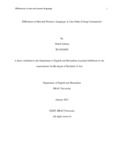| dc.contributor.advisor | Farhat, Nazah | |
| dc.contributor.author | Sultana, Sharin | |
| dc.date.accessioned | 2023-08-01T06:26:13Z | |
| dc.date.available | 2023-08-01T06:26:13Z | |
| dc.date.copyright | 2023 | |
| dc.date.issued | 2023-01 | |
| dc.identifier.other | ID: 19103045 | |
| dc.identifier.uri | http://hdl.handle.net/10361/19235 | |
| dc.description | This thesis is submitted in partial fulfillment of the requirements for the degree of Bachelor of Arts in English, 2023. | en_US |
| dc.description | Cataloged from PDF version of thesis. | |
| dc.description | Includes bibliographical references (pages 26-27). | |
| dc.description.abstract | In current society, the differences between men and women are particularly noticeable. We very
clearly distinguish between men and women. Men and women have distinct physical
characteristics, but there are also other distinctions. Gender discrimination or inequality is also a
big problem in our culture because of physical differences. Men and women are clearly separated
in our culture at all times. Gender-related concerns are also quite prevalent in the field of
language. Many academics have noted that men and women use language differently in specific
situations. Compared to men, women frequently speak more formally. The link between
language usage according to gender has been the subject of numerous research. In order to relate
the research that has already been conducted by other scholars, I will do a case study in this
paper. I have chosen eight soap opera adverts in all. The remaining four are commercials for
male soap, while four are female soap. I'll examine these eight commercials to demonstrate
whether or not the wording used in the male and female soap adverts differs. Furthermore, the
Bangladeshi background serves as the basis for my paper's setting. The socioeconomic situation
in Bangladesh has made gender-related issues particularly prevalent. Men and women are treated
differently in our culture. We not only treat people differently, but also alter the way we speak to
them. | en_US |
| dc.description.statementofresponsibility | Sharin Sultana | |
| dc.format.extent | 30 pages | |
| dc.language.iso | en | en_US |
| dc.publisher | Brac University | en_US |
| dc.rights | Brac University theses are protected by copyright. They may be viewed from this source for any purpose, but reproduction or distribution in any format is prohibited without written permission. | |
| dc.subject | Language | en_US |
| dc.subject | Gender | en_US |
| dc.subject | Society | en_US |
| dc.subject.lcsh | Language and sex. | |
| dc.subject.lcsh | Multilingualism. | |
| dc.title | Differences in men and women’s language: A case study of soap commercials | en_US |
| dc.type | Thesis | en_US |
| dc.contributor.department | Department of English and Humanities, Brac University | |
| dc.description.degree | B.A. in English | |

